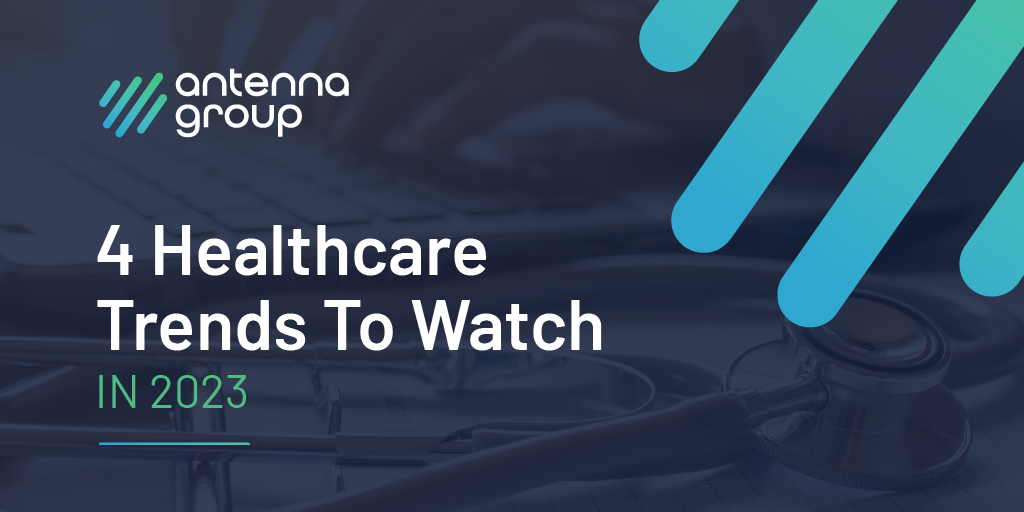
The Antenna Healthcare team outlined the top trends they will be following in 2023. What trends do you predict will take hold this year? Drop us a line to continue the conversation.
1. Only Up From Here: Digital Health Has Skyrocketed and There’s No Going Back
The COVID-19 pandemic shifted a focus to virtual healthcare and the development of software to support it. It’s been three years since the start of the pandemic, and digital health is still going strong. Once physicians, patients and the healthcare industry as a whole experienced all of the benefits that digital health has to offer – be it clinical, operational, financial and beyond – there was no going back.
Digital health technologies have eliminated many of the inefficiencies that plagued the healthcare industry, helped improve patient outcomes, and enhanced experiences for both doctors and patients. Take for example, Augmedix’s innovative technology platform, which captures natural clinician-patient conversations and converts them to medical notes in real-time, which are seamlessly transferred to the EHR. Augmedix’s products have been proven to save clinicians 2 to 3 hours per day – time they can use to see more patients or spend time with their families. Another example of a transformative digital health technology is Binah.ai, a platform that allows doctors to remotely gather a patient’s vital signs. All the patient has to do is look into the camera on their mobile device.
These are the types of technologies that have transformed the healthcare industry and continue to revolutionize it. As adoption continues, the need for continued innovation to meet demand will remain high.
–Tyler Glynn, Account Executive
2. Mental Health Crisis is Prevalent Now More than Ever
As the end of the year comes to a close, the mental health crisis courses the nation now more than ever. About 20% of adults are experiencing a mental illness, equivalent to nearly 50 million Americans.
Additionally, the COVID-19 pandemic has left lasting effects on mental health, exacerbating an already dire situation. Anxiety and depression rates increased 25% globally after the start of the pandemic, hitting women and younger people the hardest.
As 2023 begins, we expect to see an increase in funding and attention to mental health. Greater access and affordability are critical to address the crisis. At the end of last year, the U.S. Department of Education granted $280 million towards mental health services in schools, and this year Governor Kathy Hochul proposed a $1 billion plan to combat the mental illness crisis in New York, to name just a couple of examples.
Transformational technologies like BrainsWay’s Deep TMS – the helmet that is FDA-cleared to treat depression, anxious depression and OCD – have benefited so many patients, bringing them the relief they were so desperately seeking. Increased and continued support from the industry and government is critical as we bring in the new year.
– Haley Garvin, Account Executive
3. AI Drives Personalized Healthcare
In 2023, we expect that the industry will continue to move away from the “one size fits all” approach in medicine to personalized healthcare, defined by patient-centered healthcare, personalized health planning, shared decision-making, and patient engagement.
Each person has their own unique health risks, lifestyle choices and genetic makeup, which makes personalized healthcare so important. Utilizing predictive technologies, including artificial intelligence (AI) and medical professional expertise, care teams are able to comprehensively evaluate every aspect of patient care, including screening, diagnosis, treatment, prevention and management of diseases. This multifaceted approach gives physicians a look at the full picture, so they can more confidently assess disease activity, drug reactions, opportunities for preventive measures and more, allowing for more precise actionable insights for each patient.
There are some very innovative companies that are fully embracing precision medicine. For example, Octave has brought together biological, imaging, and clinical insights to clarify the path forward for the treatment and management of multiple sclerosis (MS), enabling an optimal care journey for patients to live more harmonious lives. With the support of AI, Artera.ai identifies patients that will benefit from therapy intensification and helps guide personalized treatment decisions for men with prostate cancer. Colorectal cancer can be prevented thanks to a blood test developed by CellMax Life, which provides data showing efficacy in detecting colorectal cancer and pre-cancer.
–Morrena Villanueva, Account Supervisor
4. Non-Healthcare Conglomerates Continue to Make Moves in Healthcare
This year, tech and retail players will continue to make inroads into healthcare. This is a win-win, as healthcare can be a source of top-line revenue for these companies, and on the flip side, these organizations can introduce significant technological and other advancements into the industry.
A recent example of this is Amazon’s acquisition of One Medical – expected to close this year – a membership-based primary care practice, demonstrating the power technology brings through innovation, efficiency and the ability to scale the shifts in care that are necessary to meet and satisfy customer needs.
Alphabet (Google) is working to leverage its technology platforms to solve issues with EHR interoperability and limited computing infrastructure, which specific hospital systems will benefit from through partnerships.
So many others have jumped on this healthcare bandwagon as well, and they will continue to make significant deals and advancements in healthcare this year, including CVS, Walgreens, Apple, Microsoft, and beyond.
– Leonardo Fontes III, Account Executive